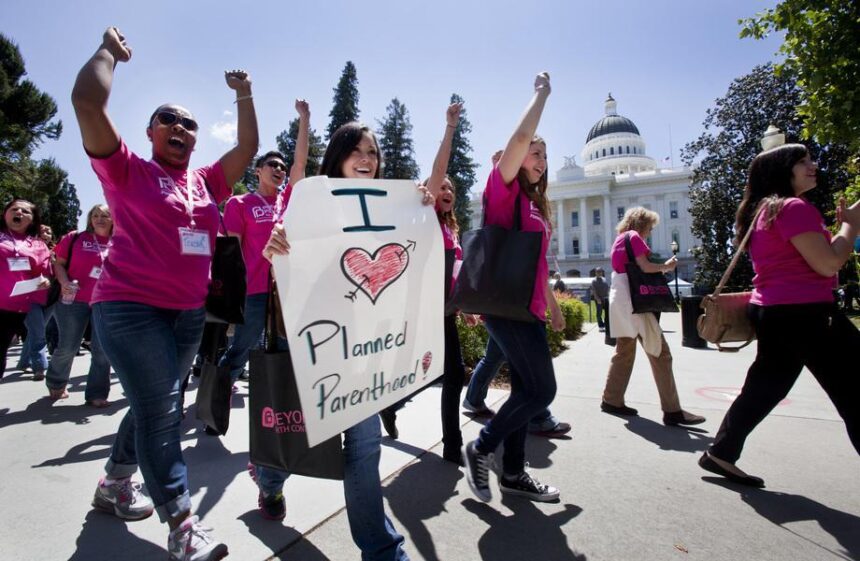In a significant setback for reproductive health services in the state, California Planned Parenthood has faced a substantial loss of $300 million in federal funding following a recent legal decision. This funding, which has been crucial for a wide range of healthcare services, including family planning and preventive care, has been a focal point in ongoing debates surrounding reproductive rights and public health funding. The ruling not only impacts the organization’s ability to deliver essential services to millions of Californians but also raises concerns about the broader implications for similar health providers across the country. As advocates and lawmakers respond to the news, the ramifications of this funding cut are likely to ripple through the state’s healthcare system and ignite further discussions on access to reproductive health services.
California Planned Parenthood Faces Severe Financial Setback Amid Legal Challenges
Amid a wave of legal challenges, California’s Planned Parenthood faces a monumental financial blow, losing a staggering $300 million in federal funding. This loss comes as a result of a recent court ruling that restricts funds to any organization providing abortion services. As the largest provider of reproductive health services in the state, Planned Parenthood’s financial woes could have severe implications for millions of Californians who rely on its services. The organization has been a critical part of the state’s healthcare framework, providing essential services including cancer screenings, prenatal care, and contraceptive counseling.
The implications of this funding cut extend far beyond the organization itself, affecting communities disproportionately reliant on these services. Key programs at risk include:
- Contraceptive Access: Limited availability of birth control options could lead to increased unintended pregnancies.
- Health Screenings: The loss of funding may reduce access to vital cancer and STD screenings.
- Education Programs: Comprehensive sex education initiatives could face significant cuts.
A recent survey highlighted that one in four women in California would lose access to reproductive health services without Planned Parenthood. As the legal landscape evolves, the organization is strategizing on how to navigate these challenges while continuing to advocate for reproductive rights and equitable healthcare access.
Impact on Public Health Services and Reproductive Rights in California
The recent court ruling has far-reaching implications for public health services across California, particularly in vulnerable communities heavily reliant on Planned Parenthood for comprehensive healthcare. With the loss of an estimated $300 million in federal funding, critical programs that provide essential services such as family planning, cancer screenings, and STI testing are now at risk. Many healthcare professionals fear that this disruption will strain already limited resources, compelling patients to seek alternative, often less accessible options. This scenario could exacerbate existing health disparities, particularly among low-income and uninsured populations.
The impact on reproductive rights cannot be overstated. With Planned Parenthood’s funding drastically reduced, the agency faces considerable challenges in maintaining its operations and the wide array of services it offers. An environment of uncertainty looms over reproductive health resources, with potential repercussions that could include:
- Increased Unintended Pregnancies: Without adequate contraceptive access and education, the number of unintended pregnancies may rise.
- Higher Rates of Sexually Transmitted Infections (STIs): Limited testing and treatment options could lead to a spike in STIs within marginalized groups.
- Greater Difficulty in Accessing Safe Abortions: Women may face longer travel times and increased costs to access safe abortion services.
These challenges underscore the urgency for policymakers to explore alternative funding mechanisms that can bridge the gap and ensure continued access to vital reproductive health services. Local governments, advocacy groups, and community organizations may need to step up efforts to support those most affected while mobilizing public support for initiatives aimed at preserving reproductive autonomy in California.
Strategies for Funding Resilience and Support for Community Health Initiatives
In light of the recent federal funding cuts impacting organizations such as California Planned Parenthood, communities are now more than ever reassessing their strategies to sustain health initiatives. Key approaches for fostering resilience include:
- Diversifying Funding Sources: Local health initiatives can seek alternative funding streams, including private grants, community fundraising events, and partnerships with businesses.
- Advocating for Policy Change: Grassroots movements can mobilize to influence legislation that supports sustained healthcare funding and access to services.
- Building Community Coalitions: Collaborations between various community organizations can strengthen advocacy efforts and create a united front for health services.
- Implementing Cost-Effective Programs: Focus on community-driven programs that maximize impact with limited funds, ensuring health services remain accessible.
Investing in innovative solutions can also enhance the resilience of community health initiatives. For example, consider the following strategies:
| Strategy | Benefit |
|---|---|
| Telehealth Expansion | Increases access to care, especially in underserved areas. |
| Integrated Services | Streamlines health services, making them more efficient and accessible. |
| Public Education Campaigns | Raises awareness of available resources and services within communities. |
To Wrap It Up
In conclusion, the recent decision to cut $300 million in federal funding to California Planned Parenthood marks a significant setback for reproductive health services in the state. As legal battles continue to unfold, the impact on access to care for millions of Californians remains to be seen. This funding loss not only raises questions about the future of Planned Parenthood’s programs but also highlights the ongoing national debate over reproductive rights and healthcare access. As the organization evaluates its next steps, advocates are calling for renewed efforts to secure funding and reinforce the importance of comprehensive healthcare services for all. The ripple effects of this ruling will likely echo through legislative halls and communities as stakeholders on all sides brace for what comes next.









